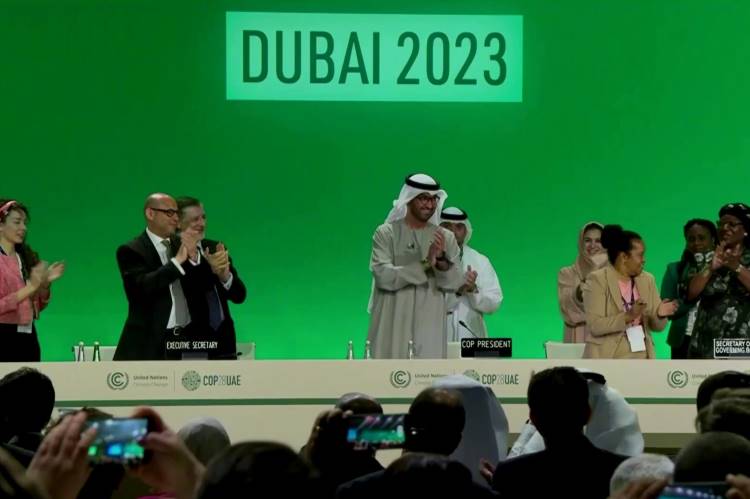
The ink on the Dubai Consensus at COP28 is barely dry, yet its implications for India’s climate strategy are already obvious. The summit’s outcomes, though just incremental progress, have significant implications for India, the third largest emitter of greenhouse gases after China and the US. The event successfully brought the critical issue of fossil fuel transition to the forefront and set ambitious targets for renewable energy and efficiency improvements. However, the lack of stronger, binding commitments, particularly in terms of a concrete fossil fuel phase-out and financial support for developing nations, emerged as a conspicuous gap.
The agreement presents India with both promising opportunities and daunting challenges. The Dubai Consensus explicitly calls for a transition away from fossil fuels. The language resonates with India’s own ambitious renewable energy goals, aiming for 50% of its electricity to come from non-fossil fuels by 2030 and net-zero emissions by 2070. The agreement also sets ambitious targets for tripling global renewable energy capacity by 2030, a development that aligns with India’s remarkable progress in this domain, having increased its solar energy capacity thirtyfold in just nine years.
While ambitious, India’s green goals are carefully balanced with its developmental realities. As a nation still striving for widespread access to basic necessities like electricity, it cannot afford a complete and immediate shift away from fossil fuels. Instead, India needs to prioritise efficient and affordable renewable energy solutions that cater to its diverse population and resource limitations. This necessitates a focus on technological innovation and cost-effective solutions, ensuring that its green transition leaves no one behind.
READ I Experts split over draft national cooperative policy
India’s COP28 strategy
India’s approach to COP28 and its own climate goals has been marked by a significant focus on green transition. The nation has been steadfast in its commitment to enhancing its renewable energy capacity, looking to generate 50% of its electricity from non-fossil fuels by 2030, a notable stride towards its broader objective of achieving net-zero emissions by 2070. This ambition is underscored by the remarkable growth in India’s solar energy capacity, which has increased thirtyfold in just nine years.
India’s current electricity generation capacity stands at 426 GW, of which renewables constitute a significant 44%, including solar, wind, hydro, and other sources. This progress aligns with COP28’s call for tripling renewable energy capacity globally, yet India’s decision not to join this call at COP28 could be interpreted as a strategic move, considering its already aggressive renewable targets and the nuances of its energy needs.
While net-zero is a crucial long-term goal, India’s climate strategy must extend beyond this singular metric. Addressing pressing issues like climate-induced water scarcity, deforestation, and biodiversity loss requires a holistic approach that tackles the root causes of environmental degradation. Investing in sustainable agriculture, ecosystem restoration, and climate-resilient infrastructure is equally important as scaling up renewable energy. This comprehensive approach ensures a more balanced and sustainable path towards a resilient future.
India’s response to the financial conundrum
The major challenge arising from COP28 for India lies in securing climate finance. The summit’s inability to secure firm commitments from developed nations to meet the promised $100 billion annual climate finance leaves emerging economies like India in a vulnerable position. The financial aspect of transitioning to a green economy is daunting, as evidenced by the massive investments planned by developed nations like the United States and the European Union in clean energy. For India, replicating such investments without adequate financial support could lead to budgetary strains, potentially affecting crucial sectors like education and healthcare.
In response to this challenge, India needs to focus on sustainable green transition, emphasising functional technologies over more speculative ones. This approach includes continuing its path without taking on new commitments that may not align with its developmental goals, especially considering India’s already low per capita emissions compared with countries like the US and China. Moreover, India must broaden its climate action beyond the narrow focus on net-zero targets.
The nation’s climate strategy should encompass a holistic view, addressing critical issues such as habitat loss, biodiversity decline, and water scarcity. This broadened approach acknowledges the multifaceted nature of environmental challenges and the need for diverse solutions.
Independent climate research is another priority area for India. The nation must invest in high-quality research that moves beyond dominant Western narratives. Such research can provide a more comprehensive understanding of climate dynamics, essential for developing effective and region-specific strategies. Employing tech-savvy experts to develop and lead practical climate strategies is crucial for India. The nation’s climate policy should be informed by realistic assessments of technological capabilities and economic feasibilities. Generalist approaches that overlook these aspects can lead to impractical and inefficient solutions.
India’s financial strategy in its transition to renewables must be marked by prudence. The nation should avoid the pitfalls of costly subsidies and focus on investing in technologies that offer tangible benefits. This approach requires a careful balance between environmental commitments and economic realities, ensuring that India’s transition to a greener future is both sustainable and equitable.
In the aftermath of COP28, India stands at a critical juncture. The nation’s pathway forward in the climate arena will require a nuanced blend of ambition, pragmatism, and strategic thinking. As India navigates the complex interplay of global climate politics, its actions will not only shape its own future but also have significant implications for the broader international community. The road ahead is challenging, but with a clear vision and strategic approach, India has the potential to emerge as a leader in the global fight against climate change.
The Dubai Consensus has presented India with a complex puzzle. While the agreement offers promising opportunities, it also lays bare the challenges that lie ahead. By embracing a strategic blend of ambition, pragmatism, and independent research, India can navigate this complex situation and emerge as a leader in the fight against climate change.
